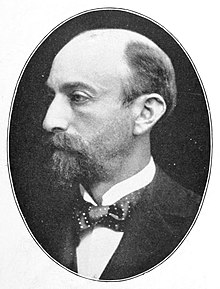Albert Buchman
Albert Buchman | |
|---|---|
 | |
| Born | April 11, 1859 Cincinnati, Ohio, US |
| Died | April 15, 1936 (aged 77) New York City, US |
| Occupation | Architect |
| Practice | Schwarzmann & Buchman; Buchman & Deisler; Buchman & Fox; Buchman & Kahn |
Albert Buchman (1859–1936) was an American architect in practice in New York.
Life and career
[edit]
Buchman was born April 11, 1859, in Cincinnati, Ohio.[1] He attended Cornell University, graduating in 1880. He then took a job with the architect Herman J. Schwarzmann in New York. In 1884, he was made junior partner in the firm of Schwarzmann & Buchman. Schwarzmann retired in 1886, and Buchman began practicing under his own name.[2] In 1887, he made Gustav Deisler junior partner in Buchman & Deisler.[a] This continued until 1899, when Deisler retired from the firm and Buchman associated with Mortimer J. Fox as Buchman & Fox.[3] This partnership lasted until 1917, when Fox was appointed a vice president of the Columbia Bank.[b]
After Fox retired, Buchman formed a fourth and final partnership with Ely Jacques Kahn, as Buchman & Kahn. Office manager John M. Montfort was also associated.[5] Due to his health Buchman eventually retired, and in January, 1930 Kahn reestablished the practice as the Firm of Ely Jacques Kahn, in association with Montfort.[6] Buchman died in New York, April 15, 1936.[1]
Buchman was a member of the American Institute of Architects from 1921 to 1929.[7]
Architectural works
[edit]- Estherwood, Dobbs Ferry, New York, 1894.
- 695–709 Sixth Avenue NYC (aka Ehrich Brothers Store) -expansion, 1894 (as Buchman & Deisler)
- 636–640 Sixth Avenue NYC (aka Alexander Building), 1896 (as Buchman & Deisler)
- 7–9 West 18th Street NYC, 1896–97 (as Buchman & Deisler)
- New facade for the Hebrew Girls' School (later Henry Street Settlement), New York City, 1900
- 16 East 18th Street NYC, 1902 (as Buchman & Fox)
- Leonori Building, New York City, 1902[9]
- 695–709 Sixth Avenue NYC (aka Ehrich Brothers Store) -expansion, 1902, (as Buchman & Fox)
- 18–22 West 18th Street NYC, 1902–04 (as Buchman & Fox)
- 162 Fifth Avenue NYC (aka Union Exchange Bank), 1903 (as Buchman & Fox)
- Hotel Le Marquis, New York City, 1905
- 684 Sixth Avenue NYC (alteration), 1905 (as Buchman & Fox)
- 85 Fifth Avenue NYC (aka Annin Building) – expansion, 1905, (as Buchman & Fox)
- 14–16 West 17th Street NYC, 1906–07 (as Buchman & Fox)
- 12–14 West 21st Street NYC, 1907 (as Buchman & Fox)
- 30–32 West 21st Street NYC, 1907 (as Buchman & Fox)
- B. Altman and Company Store, 615–629 Sixth Avenue NYC (alteration), 1909–10 & 1916–17, (as Buchman & Fox)
- 604–612 Sixth Avenue NYC (aka Price Building), 1910–1912 (as Buchman & Fox)
- 50–58 West 18th Street NYC (aka McCrorey Building), 1911–12 (as Buchman & Fox)
- The Times Square Building, New York City, 1912
Notes
[edit]- ^ Deisler had worked for the Schwarzmann firm for several years and was a graduate of the technical schools of Stuttgart and Munich.[2] After ending his association with Buchman, Deisler formed the contracting firm of Deisler & Stevenson.
- ^ Fox's father, Joseph Fox, had been president of this bank from 1889 to 1916.[4]
References
[edit]- ^ a b Albert Buchman at archINFORM
- ^ a b "Buchman & Deisler," A History of Real Estate, Building and Architecture in New York City (New York: Real Estate Record Association, 1898): 697.
- ^ "Of Interest to the Building Trades," Real Estate Record and Builders Guide 64, no. 1651 (November 4, 1899): 681.
- ^ "Banking and Financial News," Commercial and Financial Chronicle 105, no. 2730 (October 20, 1917): 1592.
- ^ Architecture and Building 49, no. 10 (October 1917): 24.
- ^ Architecture and Building 62, no. 1 (January 1930): 22.
- ^ "Albert Buchman", aiahistoricaldirectory.atlassian.net, AIA Historical Directory of American Architects, n. d.
- ^ "Ladies' Mile Historic District Designation Report" (PDF). New York City Landmarks Preservation Commission. 1989. Retrieved 31 January 2021.
- ^ Gray, Christopher (14 February 1988). "Streetscapes: The Leonori". The New York Times. Retrieved 19 February 2016.
